How To Treat Kidney Disease In Dogs And Cats
Hearing that your cat or dog has kidney disease can seem devastating, but early diagnosis and management can give your pet the best chance of survival. Kidney disease in cats is more common than in dogs and occurs most frequently as pets age. Some pets may be born with malformed or congenital kidney disease which will result in renal insufficiency at an early age. What can you do to treat your pet's kidney disease? Using holistic treatments combined with conventional veterinary care can help your pet live as close to a normal life as possible and slow the disease's progression. While there isn't a cure for kidney disease in dogs and cats, you can support and strengthen your pet's nephrons (the filtering units in the kidneys) to help them function better.
The Story Behind Ask Ariel: Ariel's Journey with Kidney Disease
 Our company began with Ariel the Siberian Husky mix. At 13 years of age, after leading a very healthy and happy life, she was suddenly diagnosed with canine chronic kidney disease. Her creatinine level was 6.4 (very high out of the normal range) even though her blood test 5 months prior had been on the high end of normal. Kidney disease can be detected with gradual changes in some pets (as is often the case with elderly cats) or suddenly where the pet seemed fine the day before and now is no longer wanting to eat and is completely listless. Ariel was dying before Pet Nutritionist Susan Blake Davis' eyes and she wanted to save her. The research, supplements and treatments that helped Ariel with her triumphant journey over kidney disease (she died over a year later due to a tragic fall) are what inspired Susan Blake Davis to start Ask Ariel Your Pet Nutritionist. We wanted to share our story in the hopes that we could help other pet owners who are struggling with the same condition. Our company began with Ariel the Siberian Husky mix. At 13 years of age, after leading a very healthy and happy life, she was suddenly diagnosed with canine chronic kidney disease. Her creatinine level was 6.4 (very high out of the normal range) even though her blood test 5 months prior had been on the high end of normal. Kidney disease can be detected with gradual changes in some pets (as is often the case with elderly cats) or suddenly where the pet seemed fine the day before and now is no longer wanting to eat and is completely listless. Ariel was dying before Pet Nutritionist Susan Blake Davis' eyes and she wanted to save her. The research, supplements and treatments that helped Ariel with her triumphant journey over kidney disease (she died over a year later due to a tragic fall) are what inspired Susan Blake Davis to start Ask Ariel Your Pet Nutritionist. We wanted to share our story in the hopes that we could help other pet owners who are struggling with the same condition.
Dog & Cat Kidney Disease Treatment
Combining conventional treatments with holistic approaches can offer a comprehensive and balanced strategy for managing cat and dog kidney problems. Integrating traditional veterinary care with natural therapies can enhance the overall well-being of pets, providing them with a broader range of treatment options. This combined approach ensures that pets receive the best possible care, maximizing their chances of improvement and a better quality of life.
- Monitoring and Diagnostics: Monitoring blood and urine in pets with kidney disease is crucial for managing the condition effectively. Key blood values to monitor include blood urea nitrogen (BUN), creatinine, and phosphorus levels, as these indicate the kidney’s ability to filter waste. Urine tests focus on specific gravity, protein levels, and the presence of blood or bacteria. Low specific gravity indicates the kidneys’ reduced ability to concentrate urine. Regular monitoring of these values helps veterinarians tailor treatments, such as fluid therapy, dietary modifications, and medications, to slow disease progression and enhance the pet’s quality of life.
- Fluid Therapy: Administration of intravenous (IV) or subcutaneous (SubQ) fluids helps manage dehydration and electrolyte imbalances while supporting kidney function. Fluids make pets feel significantly better because they rehydrate the body, improve blood circulation, and help flush out toxins that the kidneys are struggling to eliminate.
- Phosphorus Binders: Phosphorus binder are an essential cat and dog kidney disease treatment because they reduce blood phosphorus levels. Kidney disease impairs a cat or dog's kidneys ability to filter out excess phosphorus for the blood, which can cause symptoms such as nausea, vomiting and a loss of appetite. Reducing blood phosphorus can help alleviate these symptoms. Phosphorus binders help cats and dogs with kidney disease by binding to the phosphorus present in the food they eat.
- Holistic Supplements: Treating kidney disease in dogs and cats naturally using home remedies can help by flushing out the toxins, filtering out metabolic waste and supporting kidney function.
- Prescription Medications: Veterinarians may prescribe medications to treat kidney disease in dogs and cats to address various complications and symptoms associated with the condition. For example, blood pressure medications may be necessary to manage hypertension which is common in pets with kidney disease. Additionally, medications to treat anemia, such as erythropoietin-stimulating agents or iron, are crucial since kidney disease can reduce the production of red blood cells, leading to fatigue and weakness.
- Kidney Disease Diet: Pets with kidney disease can benefit from a lower phosphorus diet because it reduces the burden on their kidneys, helping to slow the progression of the disease and prevent complications like secondary hyperparathyroidism. Avoiding high-phosphorus foods while increasing omega-3 fatty acids in the diet can also help reduce inflammation and support overall kidney health. Additionally, incorporating fiber-rich foods like pumpkin can aid in digestive health and help remove toxins from the body, providing further support to the kidneys.
Molly
"Molly, our 13 year old black lab was diagnosed with kidney disease and was given a few months to live. She had been healthy most of her life and my husband and I were stunned with the diagnosis. In addition to her kidney disease, her legs were getting weak from arthritis and she was also starting to show signs of dementia. Needless to say, we were not optimistic about her future. That weekend, we went to the Pet Expo in Baltimore and were lucky enough to talk to a vendor who recommended we contact AskAriel.com. We used Renelix and the Kidney Health Formula for her kidney disease in addition to the Amazing Omegas and used the diet that was recommended for her. We've been treating her with the supplements in addition to administering sub-q fluids and 5 months later Molly is still eating, drinking and very much full of life. We know that she is still with us because of Ask Ariel's expertise, compassion and arsenal of supplements. We are so grateful we found Ask Ariel and have already started our younger dog, Brandy on the Amazing Omegas. - Jennifer, Maryland
Signs of Kidney Failure in Dogs and Cats
The kidneys are bean-shaped organs that operate as filtering mechanisms in the body. The kidneys filter out toxins in the blood such as metabolic wastes, drugs and mineral salts. The kidneys also help regulate blood pressure, balance the acidity of the blood, maintain calcium and phosphorus metabolism, and produce a hormone that stimulates red-blood-cell production. Since the kidneys perform so many important functions, it is easy to see why kidney malfunction would greatly impact the way your pet feels and behaves.
Kidney disease can be insidious, appearing "suddenly" even in seemingly healthy pets. Early signs are subtle, such as a lack of appetite in the morning, which owners may attribute to old age. Kidney disease can progress rapidly in some and slower in others. Clinical signs often only appear when at least two-thirds of the kidneys are dysfunctional. Given that kidney failure can be fatal, annual blood and urine tests are critical, along with watching out for the warning signs and notifying your veterinarian if you see them. Common signs of kidney disease may include:
- Increased urination
- Increased thirst
- Weight loss
- Loss of appetite
- Strong (ammonia-like) breath odor
- Listless, lethargic
- Vomiting
Ginger
"Last year our Ginger escaped & spent the night outside. We have no idea what she got into, but she became very sick. That Saturday, at the veterinary clinic, the doctor believed there was something wrong with his laboratory equipment. I even heard him in the back room calling the company that had recently calibrated the machine to complain. He sent her blood to an outside lab. I had Renelix on hand for my other kitty with kidney disease and started Ginger on it immediately. The following Monday our veterinarian phoned and stated that the outside lab had confirmed Ginger's severe acute renal failure. He stated "Normally when I notify somebody of results this poor, they no longer have a pet that is living". I explained that we had been through this before, and I attributed Ginger's survival to the kidney supplements for cats I had received in the past from Ask Ariel. Ginger was receiving IV hydration at home, as well as Renelix and the diet as advised by AskAriel. Ginger returned to her normal, healthy & spoiled self! Fortunately, she also slimmed down from her previous tubbiness! I can't thank Susan Davis and Ask Ariel enough!!" - Suzanne, Florida
Understanding Kidney Values in Test Results
In the blood, there are three levels that are especially important to test for kidney disease. These are:
- Creatinine - A waste product from muscle and protein metabolism filtered by the kidneys. Elevated levels indicate impaired kidney function. As kidney function declines, the creatinine level in the blood will continue to rise.
- BUN (Blood Urea Nitrogen) - Measures urea nitrogen, a waste product of protein metabolism. High BUN levels suggest the kidneys aren't functioning properly.
- Phosphorous - Another waste product removed by the kidneys. High phosphorus levels indicate kidney filtration is impaired. Elevated blood phosphorus levels can contribute to lethargy and poor appetite.
IV Therapy vs. Subcutaneous Fluid Therapy
When pets have kidney disease, their kidneys lose efficiency in flushing out toxins. Veterinarians often recommend fluid therapy to help keep the pet hydrated, support kidney function in removing toxins, and replenish electrolytes. Fluid therapy can be administered through IV fluids or subcutaneous fluids (under the skin). Both methods can alleviate nausea and generally make pets feel much better, often resulting in increased appetite and activity levels.
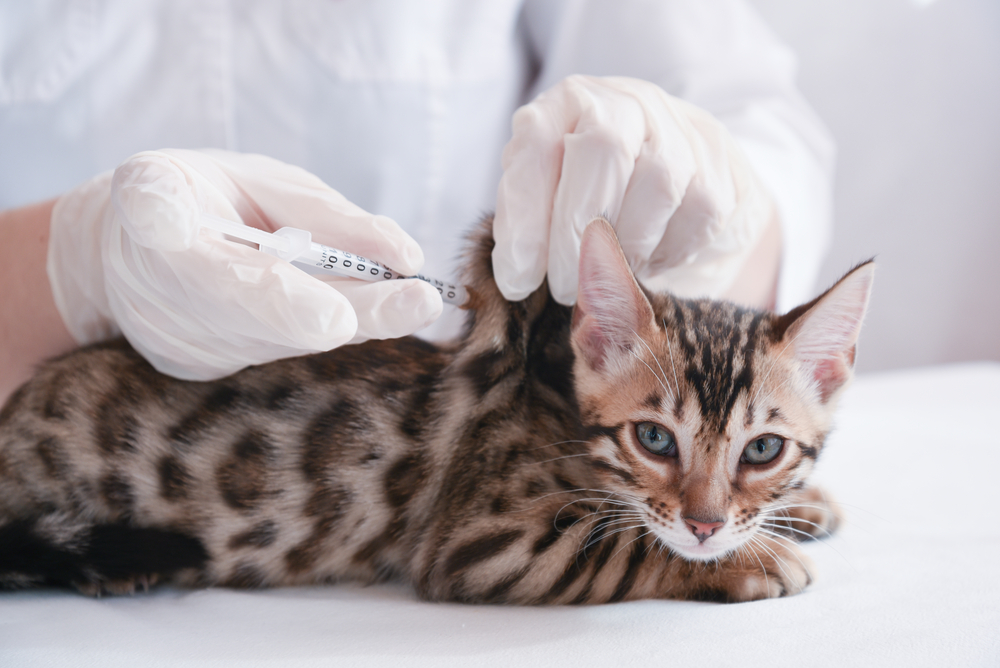
- IV Fluids are administered by injecting the fluid directly into your pet's vein and must be done in your veterinarian's office. IV fluid therapy offers continuous hydration which is the most efficient method for toxin removal. IV fluid therapy can be stressful for pets and costly due to hospital stays. If a pet is badly dehydrated or in chronic renal failure, IV fluid therapy can bring fast relief and help pets feel better quickly.
- Subcutaneous Fluids are given at home by the pet owner. While that might sound scary, many pet owners (even those afraid of needles) can be easily trained by their veterinarian. Pet owners inject the fluids under the skin in between the pet's shoulder blades. A blob will form under the skin and the pet will absorb the fluid gradually over time. Depending upon the pet's kidney function, fluids are given anywhere from 2 times a day to every few days. This method reduces the stress of hospitalization and allows for regular, comfortable treatment at home.
Zoe
"My beautiful, sweet, soon-to-be 13 year old "baby" girl Zoe is thriving thanks to Ask Ariel supplements. She was diagnosed with a kidney issue over a year ago and today her numbers improved and she is enjoying life. She is my fierce loyal companion. Thanks to Ask Ariel I am sure we will have many more years of memories together. Thank you for giving us both renewed hope!" - Claudia, Georgia
Products used: Power Probiotic, Kidney Health Protein Support, Ultra-Flex, Purrfect Pet CoQ10.
Why Does Kidney Disease Cause Inappetence?
Kidney disease disrupts the normal filtration of metabolic waste, leading to a buildup of toxins in the bloodstream, a condition known as uremia. This toxin buildup can severely affect a pet's overall health. One of the earliest and most noticeable signs of kidney disease is a lack of appetite, especially in the morning.
Pet owners may initially attribute finicky eating to old age, but it's often an indicator of nausea caused by uremia. It's very common for pets to eat something one day and then refuse it the next. This can make caring for a pet with kidney disease extremely challenging. Many dog and cat owners report having multiple cans of opened food in the refrigerator, as their pets will eat something one day but refuse it the next. Some pets may only eat food at room temperature or warmed but lose interest once it has been refrigerated. These signs should not be ignored, as they indicate that toxins are building up and the pet needs kidney support.
As kidney disease progresses, the pet's ability to detoxify diminishes, causing the body to become more acidic. This can lead to worsening symptoms of uremia, including lethargy, nausea, vomiting, diarrhea, and bad breath. Managing these symptoms will often require a lot of patience and persistence in finding natural, palatable foods that your pet will eat. Supplements for dogs and cats with kidney disease can be especially helpful as they can coat the stomach, give pets energy, assist in the detoxification process and increase their appetite.
The Connection Between Hypertension & Kidney Disease
Hypertension is the medical term for high blood pressure. In both cats and dogs, it is most commonly found as a complication of other underlying medical conditions - in particular kidney disease. When the kidneys are damaged, either by age or disease, it becomes more difficult for blood to filter through them effectively. This can increase blood pressure. Studies show that about 60% or more of cats and dogs with kidney disease also have hypertension.
In cats, hyperthyroidism is often linked to both hypertension and kidney disease. As the most common hormonal disorder in cats, hyperthyroidism causes the thyroid to become overactive and produce excess hormones. This results in an increased metabolism and elevated heart pumping pressure, leading to high blood pressure. The heightened blood pressure can impact kidney function, as the blood flows too quickly through the kidneys to be properly filtered. Many pet owners seek the best supplements for cats with kidney disease to help manage and balance these multiple health conditions.
Natural kidney support supplements can help maintain optimal filtering function in the kidneys and decrease the risk of high blood pressure in cats and dogs. Purrfect Pet CoQ10 is essential for dogs and cats with heart and kidney diseases.
Kidney Support for Dogs and Cats
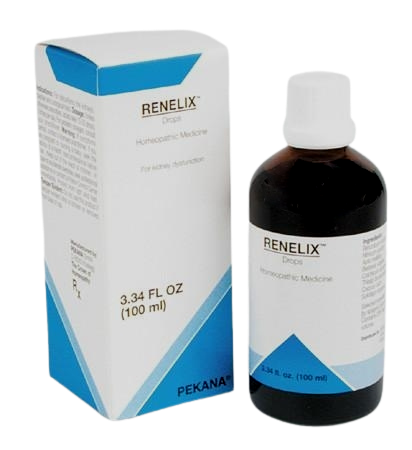
Renelix is one of the best kidney supplements for dogs because it is a hallmark detox supplement. Renelix flushes out toxins that accumulate in the kidneys and urinary tract. It is also one of the most commonly ordered supplements for cats with kidney disease, but must be administered by syringe. While there are no guarantees and kidney damage is permanent, in many instances, Renelix has been show to slow the progression of the disease, improve symptoms and some pets do show improvement in laboratory tests after using the supplement. Excellent value - one bottle will last a small pet for over 9 months!
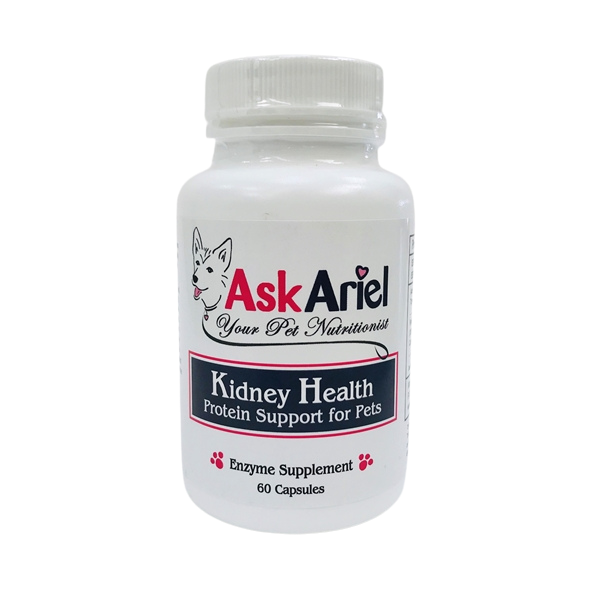
Kidney Health provides natural kidney support for dogs and cats. It breaks down protein and assists the kidneys to eliminate metabolic waste. Kidney Health is one of the best kidney supplements for cats because it is a tasteless powder that is easy to administer. Helps pets with kidney disease, protein loss in the urine, diabetes and protein malabsorption. Contains proteolytic enzymes that reduce inflammation and provide support for pets with protein loss and conditions that affect protein metabolism. Essential for diabetic pets as the kidneys are adversely affected.
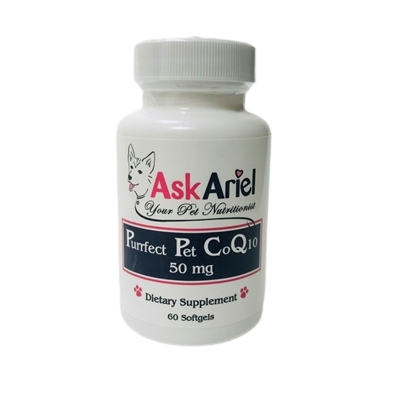
Purrfect Pet CoQ10 is the best CoQ10 for dogs with kidney disease. NON-GMO Ubiquinol. This antioxidant plays a critical role in cell production and is essential for kidney and heart function. Kaneka Ubiquinol™ helps to protect cells, tissues and organs from oxidative damage caused by free radicals. CoQ10 also helps to boosts the immune system and reduces inflammation.
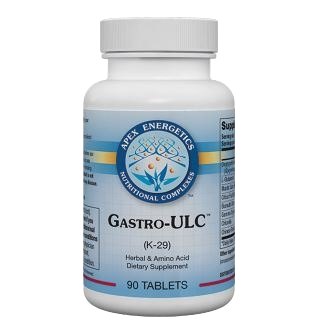 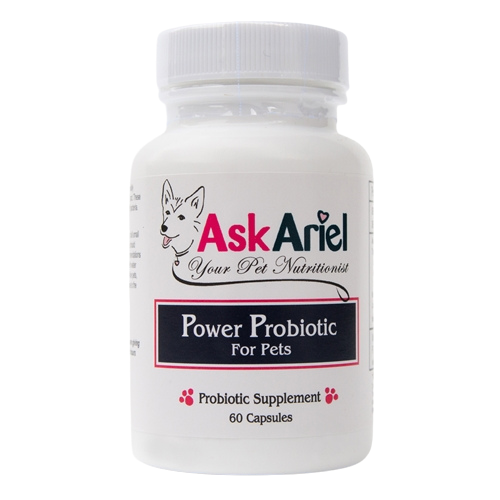 Gastro ULC + Power Probiotic provide comfort to pets with kidney disease by relieving symptoms of nausea due to acid buildup. One of the hallmark symptoms of kidney disease is that pets develop acid stomach and inappetence as the kidneys are not able to properly flush out toxins. Pets become very picky and often lose weight. Gastro ULC and Power Probiotic help relieve stomach discomfort and reduce vomiting, improving your pet's appetite. Power Probiotic contains ingredients similar to Azodyl (Bifidobacterium longum and Lactobacilus acidophilus). Research studies of these two probiotic strains reported positive effects in renal function and decreased blood urea nitrogen (BUN), urea and ammonia. Gastro ULC + Power Probiotic provide comfort to pets with kidney disease by relieving symptoms of nausea due to acid buildup. One of the hallmark symptoms of kidney disease is that pets develop acid stomach and inappetence as the kidneys are not able to properly flush out toxins. Pets become very picky and often lose weight. Gastro ULC and Power Probiotic help relieve stomach discomfort and reduce vomiting, improving your pet's appetite. Power Probiotic contains ingredients similar to Azodyl (Bifidobacterium longum and Lactobacilus acidophilus). Research studies of these two probiotic strains reported positive effects in renal function and decreased blood urea nitrogen (BUN), urea and ammonia.
.png)
Happy Paws Organic Hemp Extract are easy-to-use organic hemp extract drops. Happy Paws can help manage the symptoms of kidney disease and make your pet feel more comfortable. Many pets with kidney disease will have digestive distress resulting in a reluctance to eat. This is especially true in senior cats. Happy Paws CBD for cats with kidney disease can help stimulate your pet’s appetite and reduce pain, inflammation and vomiting. Your pet can also enjoy general health benefits from using Happy Paws. As pets age, they can develop health conditions that impact their daily lives (arthritis, anxiety, dementia, etc.) and our Happy Paws Drops have been found to help these conditions and improve your pet's overall well-being.
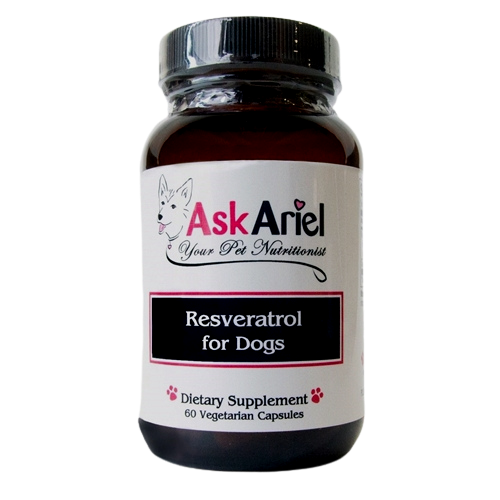 Resveratrol for Dogs - Resveratrol's antioxidant activity can help neutralize harmful free radicals and reduce oxidative damage to kidney cells. Natural anti-inflammatory and anti-fibrotic properties help to reduce inflammation within the kidneys and inhibit the formation of scar tissue (fibrosis). Research shows that resveratrol promotes vasodilation (the widening of blood vessels) which may enhance blood flow to the kidneys. Improved blood flow can help deliver essential nutrients and oxygen to the kidneys while aiding in the removal of waste products. Neuroprotective, energizing, promotes longevity. Excellent for senior dogs. Resveratrol for Dogs also supports immune function. Resveratrol for Dogs - Resveratrol's antioxidant activity can help neutralize harmful free radicals and reduce oxidative damage to kidney cells. Natural anti-inflammatory and anti-fibrotic properties help to reduce inflammation within the kidneys and inhibit the formation of scar tissue (fibrosis). Research shows that resveratrol promotes vasodilation (the widening of blood vessels) which may enhance blood flow to the kidneys. Improved blood flow can help deliver essential nutrients and oxygen to the kidneys while aiding in the removal of waste products. Neuroprotective, energizing, promotes longevity. Excellent for senior dogs. Resveratrol for Dogs also supports immune function.
PureOcean Wild Omegas fish oil is also helpful for pets with kidney disease. It contains omega-3 fatty acids that help reduce inflammation and reduce filtration hypertension, which helps to improve kidney function. Many times, pets with kidney disease will suffer from digestive upset. Soothing Digestive Relief contains a special blend of herbs and plant enzymes that can help dogs and cats with diarrhea, indigestion, tummy rumbling, mucous in the stool, upset stomach, gas and bloody stool.
Food For Cats & Dogs With Kidney Disease
Cats and dogs with kidney disease can benefit from a reduced protein, restricted phosphorus diet. Many pets with renal insufficiency will use phosphorus binders to absorb dietary phosphorus, which reduces the workload on the kidneys and helps alleviate nausea. Instead of commercially prepared prescription diets that may contain chemicals and synthetic ingredients, pets can thrive on a natural, kidney-friendly diet.
Pets with kidney disease often have a reduced appetite and can become very finicky with their food. Reducing protein and phosphorus intake decreases the buildup of metabolic waste, helping pets feel better. Foods high in phosphorus, such as bones, organ meats (like liver), egg yolks, dairy, and fish, should be avoided. However, omega-3 fatty acids from fish oil can reduce inflammation and improve kidney function. Foods for dogs with kidney disease can include freshly steamed vegetables like green beans, carrots, and squash, which are high in fiber and vitamins. For finicky cats, varying the forms and temperatures of food can make meals more palatable. At Ask Ariel, we will include free kidney diet tips on the packing slip that comes with your order.
|
|
|
What supplements can I give my cat with kidney disease?
Natural supplements can help support kidney function and slow the progression of kidney disease (CKD). Supplements can’t help repair damaged kidneys. Unlike the liver, the kidneys cannot regenerate new tissue. But, the goal of using supplements is to help the kidneys flush out toxins and improve the efficiency of the remaining nephrons. Our holistic spagyric remedy Renelix is the first line of defense for cats with kidney disease because it can help flush out toxins in the kidneys and urinary tract. Kidney Health Protein Support, a blend of proteolytic enzymes, improves the efficiency of kidney function by breaking down protein and improving the elimination of metabolic waste. In addition, veterinarians often prescribe phosphorous binders to be given with meals to reduce the amount of phosphorous that needs to be processed by the kidneys.
What can I feed my dog with kidney disease?
Dogs with kidney disease often have a reduced appetite due to uremia and can become very finicky with their food. By reducing protein and phosphorous in a dog’s diet, there is less buildup of metabolic waste and dogs start to feel better. When a dog has chronic renal failure (CRF), the kidneys are not able to efficiently filter waste products from the blood resulting in uremia. When urea and other nitrogenous waste compounds buildup in the blood, dogs feel lethargic and nauseated. By restricting phosphorous, protein wastes are reduced, decreasing the workload on the kidneys. Foods especially high in phosphorous include bones, organ meats such as liver, egg yolks, dairy and fish. While fish should be avoided, due to its high levels of phosphorous, omega-3 fatty acids from fish oil can help to reduce inflammation and improve kidney function. Freshly steamed vegetables (e.g. green beans, carrots, squash) that are high in fiber and vitamins can help to lower dog kidney protein. At Ask Ariel, we will include free kidney diet tips on the packing slip that comes with your order.
What are the best kidney supplements for dogs?
The best kidney supplements for dogs will help to flush out toxins and metabolic waste and support the remaining kidney function. Renelix is essential for dog kidney support because it can help flush out toxins in the kidneys and urinary tract. Kidney Health Protein Support, a blend of proteolytic enzymes, improves the efficiency of kidney function by breaking down protein and improving the elimination of metabolic waste. Power Probiotic contains ingredients similar to Azodyl (Bifidobacterium longum and Lactobacillus acidophilus). Research studies of these two probiotic strains reported positive effects in renal function and decreased blood urea nitrogen (BUN), urea and ammonia. Research studies show that CoQ10 for dogs with kidney disease can help to lower creatinine and blood urea nitrogen levels.
What can I give my cat for kidney failure?
Renal insufficiency is common in senior cats. Natural kidney disease remedies for cats work best when they are used in combination with conventional veterinary treatments and a reduced phosphorus diet. Feeding a phosphorous-restricted diet along with a phosphorous binder, administering subcutaneous fluids and using a few kidney supplements for cats can improve longevity and quality of life. Holistic supplements for kidney failure can help the kidneys to break down protein, excrete toxins and perform at a significantly improved level. Renelix is our hallmark kidney detox formula. It helps to flush out toxins in the kidneys and urinary tract. Kidney Health Protein Support for Pets helps to break down proteins and reduces the workload on the kidneys and liver. If your cat is suffering from acid stomach or inappetence due to uremia, Power Probiotic and Gastro ULC can help relieve stomach discomfort and reduce vomiting, improving your pet's appetite. At Ask Ariel, we will include free cat kidney diet tips on the packing slip that comes with your order.
Can hyperthyroidism in cats cause kidney problems?
Cats with hyperthyroidism often develop other health issues such as high blood pressure (hypertension) and kidney disease. Recent studies show that hyperthyroidism in cats can contribute to the development or progression of kidney disease. Hyperthyroidism is a hormonal disorder in which the thyroid becomes hyperactive and produces too much hormone. This accelerates metabolism, overstimulates the heart muscle and can lead to high blood pressure. The increased renal blood flow reduces the effectiveness of kidney filtration and can lead to proteinuria and reduced kidney function over time. Supplements such as Renelix, Power Probiotic and Kidney Health can support kidney function. Olive Leaf Extract and Purrfect Pet CoQ10 are helpful for blood pressure regulation.
|
|
|